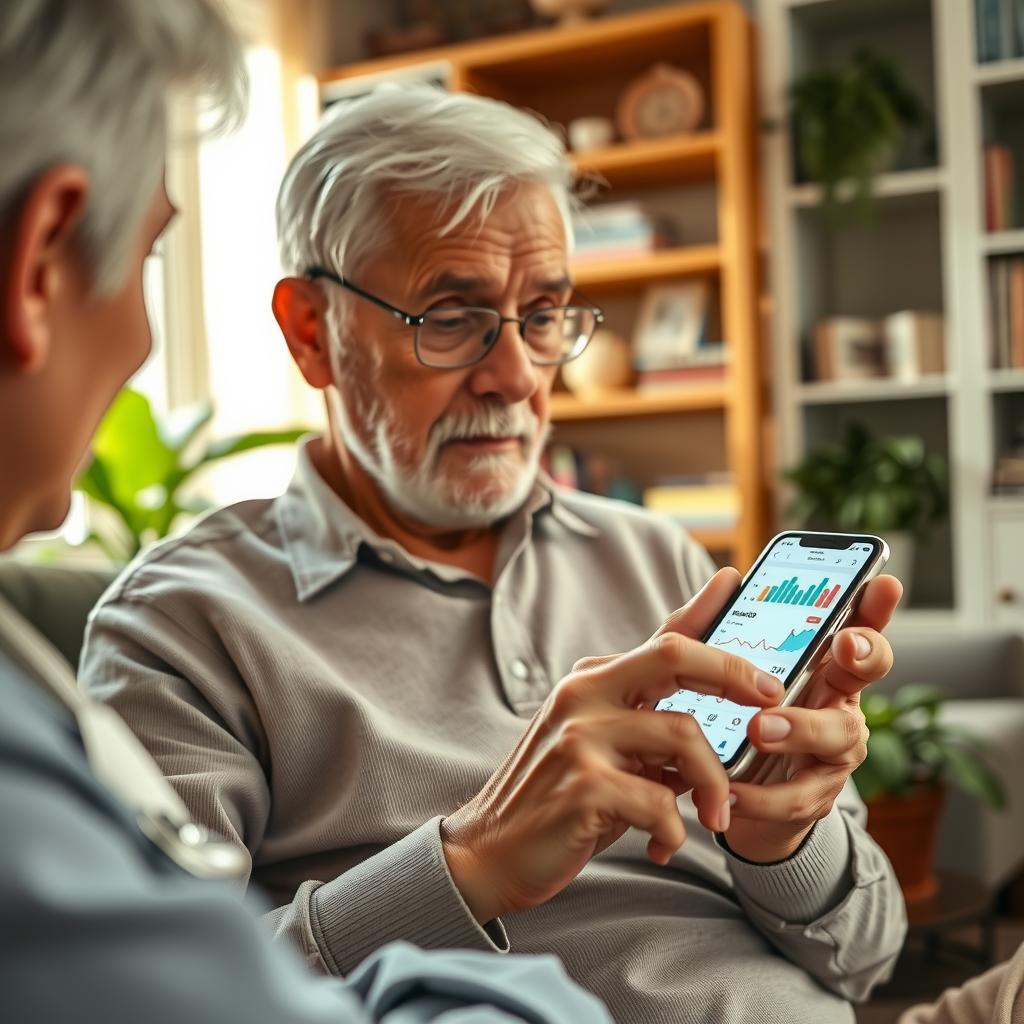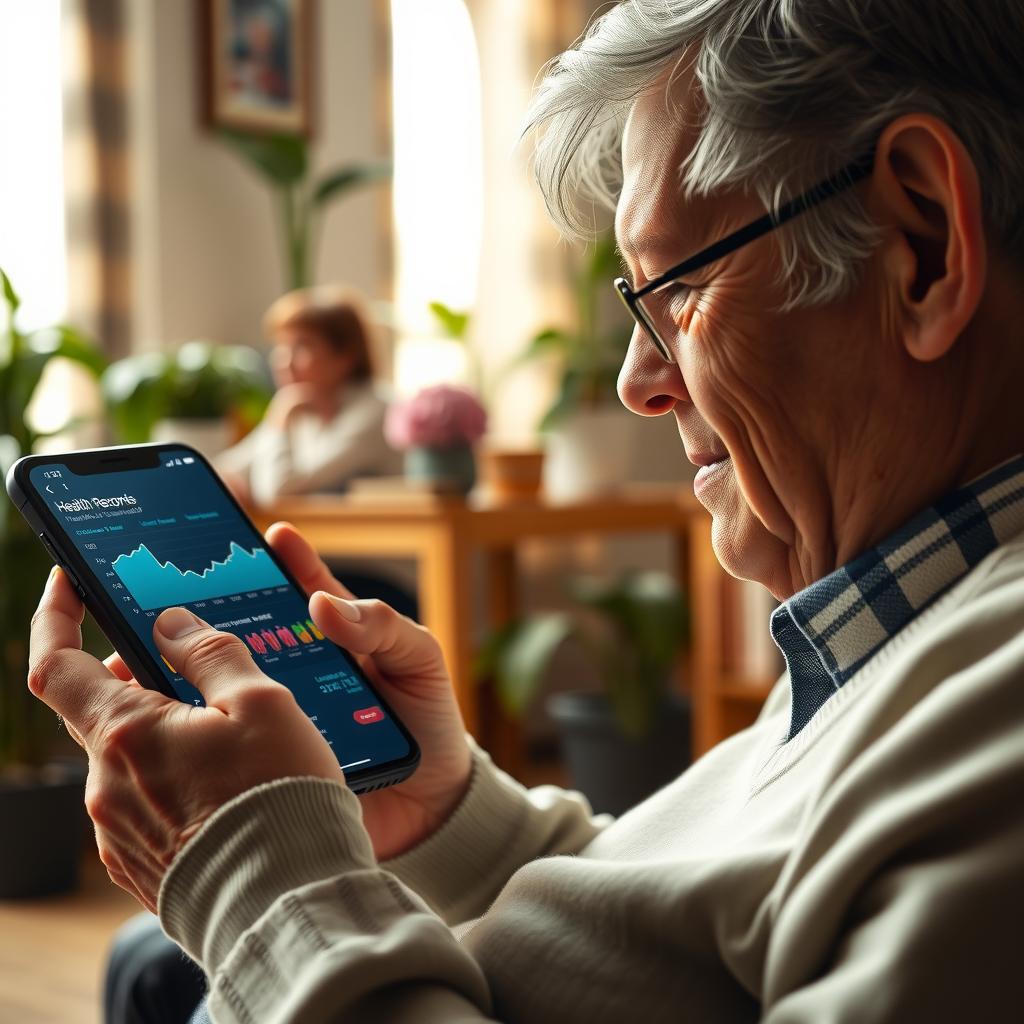In today’s fast-paced world, managing medical records can often feel overwhelming, especially for seniors who may not be as familiar with digital technology. As healthcare becomes increasingly digitized, it is vital to ensure that personal health information remains organized and easily accessible. The challenge lies in navigating the myriad of options available on smartphones while also maintaining a sense of security around sensitive patient data. This blog post aims to address these concerns by offering senior-friendly tips for effectively managing health information directly from one’s phone.
With the rise of smartphones, individuals now have an unprecedented opportunity to store their medical records in one convenient location. However, many seniors may find themselves hesitant or unsure about how to utilize these devices for such an important task. This hesitation can lead to disorganization or even loss of valuable health data when it is needed most — during a medical emergency or routine appointment. By establishing efficient methods for digital storage and record organization on their phones, seniors can gain peace of mind knowing they have quick access to essential information at their fingertips.
The core value of this article lies in its practical approach: providing straightforward strategies that cater specifically to the needs and preferences of senior users without overwhelming them with technical jargon or complicated processes. From selecting user-friendly applications designed for easy navigation, ensuring proper patient data security measures are in place, to organizing records so that critical details are readily available—this guide seeks not only to simplify the management process but also empower seniors in taking charge of their health care journey.
As we delve deeper into this topic, readers will discover actionable insights that make it possible for them—or their loved ones—to take control over their medical records using just a smartphone. By outlining clear steps and highlighting useful tools along the way, this article promises a smooth transition into better management practices that fit seamlessly within everyday life. Whether it’s tracking medications or accessing lab results quickly before an appointment, effective phone management allows seniors greater autonomy over their health decisions—and that’s something everyone deserves as they age gracefully.

Key Points:
-
Choosing the Right Apps: Selecting user-friendly applications is essential for seniors to manage their health information efficiently. Many apps designed for phone management allow easy storage and retrieval of vital documents, ensuring that medical records remain well-organized and accessible at all times.
-
Understanding Privacy Settings: Seniors must familiarize themselves with security features offered by various applications. Prioritizing patient data security is crucial; hence, knowing how to navigate privacy settings can enhance confidence in managing sensitive health information digitally.
-
Emphasizing Digital Literacy: Incorporating basic digital literacy skills into daily routines can significantly empower older adults. By providing simple guidelines on utilizing technology, seniors can feel more comfortable accessing their medical records and maintaining effective record organization through smartphones.

Understanding the Importance of Medical Records
The Role of Organized Health Records in Senior Care
Maintaining organized health records is crucial for effective communication between seniors and their healthcare providers. As individuals age, they often manage multiple health conditions which necessitate consistent tracking of medical records. This organization leads to a smoother flow of information during consultations, enabling healthcare providers to make informed decisions swiftly. For instance, when a senior visits a new doctor or specialist, having all pertinent health information readily available can significantly reduce appointment time and enhance the quality of care received. Additionally, with well-maintained records, any changes in medication or treatment plans are easily traceable—this context supports better adherence to prescribed therapies and ultimately improves patient outcomes.
Reducing Stress Through Record Management
Simplifying Access to Critical Health Information
For many seniors, managing personal health data can be daunting; however, employing strategies such as digital storage makes this task much simpler. By transitioning from physical files to electronic formats via secure platforms ensures that important documents are not only preserved but also easily accessible whenever needed. Seniors who adopt these practices often report feeling less overwhelmed by their health management responsibilities since they can quickly retrieve necessary documentation like lab results or past prescriptions through simple searches on their devices. Moreover, easy access fosters confidence in engaging with various medical professionals without the fear of forgetting crucial details about their history or treatments.
Enhancing Patient Data Security
Safeguarding Sensitive Information in an Age-Old System
The importance of securing sensitive patient data cannot be overstated—especially for seniors who may be at greater risk for identity theft or fraud due to vulnerable circumstances. Properly organized medical records help mitigate these risks while ensuring that record organization adheres to best practices concerning confidentiality and safety protocols. Utilizing technology such as encrypted cloud storage enables caregivers and patients alike to protect vital information against unauthorized access while providing reliable backup options should physical documents become lost or damaged over time. By prioritizing both accessibility and security within record management systems, families can feel reassured knowing that their loved ones’ confidential details remain protected.
Leveraging Technology for Better Communication
Connecting Healthcare Providers Effectively
In today’s interconnected world, leveraging technology has become essential for enhancing communication among healthcare networks—a feature particularly beneficial for elderly patients navigating complex medical landscapes filled with various specialists and providers involved in their care journey. Implementing robust phone management systems allows seniors easier access not only to appointments but also facilitates direct lines of contact with practitioners regarding urgent inquiries related directly back into those meticulously maintained medical records. The seamless transfer between different sectors within healthcare services reduces gaps that might lead either inadvertently disrupt healing processes due miscommunication surrounding treatment plans—thus underscoring how critical accurate recordkeeping truly is when it comes maintaining optimal wellness throughout one’s later years.
Choosing the Right Applications for Seniors
Intuitive Tools to Manage Health Information
In today’s digital age, older adults are increasingly encouraged to embrace technology, especially when it comes to managing their health. Numerous applications have emerged designed specifically with seniors in mind, focusing on user-friendly interfaces that allow for easy navigation. One of the primary concerns among older adults is the effective storage and management of their medical records. Mobile applications can serve as a central hub for all relevant health information, ensuring that important data is not only stored securely but also easily accessible whenever needed.
The significance of patient data security cannot be overstated; seniors often worry about safeguarding sensitive medical information from unauthorized access. Many reputable mobile applications incorporate advanced encryption methods and secure cloud storage solutions that provide peace of mind while allowing users to maintain control over who has access to their records. By utilizing these tools, elderly individuals can efficiently organize their healthcare details—such as medication lists, appointment schedules, and doctor contact information—all within a single platform.
Furthermore, senior tips regarding effective phone management highlight how these apps can simplify life by offering reminders for medication refills or upcoming appointments. These easy-to-use features ensure that seniors remain compliant with their treatment plans without feeling overwhelmed by technological complexities. The ability to track various health metrics such as blood pressure or glucose levels fosters a sense of empowerment among older adults; they become more engaged in monitoring their own well-being.
Moreover, many applications offer functionalities like sharing capabilities which permit family members or caregivers access to critical health information at any time. This collaboration enhances communication between seniors and those involved in their care journey while promoting better overall health outcomes through informed decision-making based on up-to-date statistics and reports from the app itself.
Ultimately, selecting an application designed specifically for managing one’s health information goes beyond mere convenience; it addresses significant barriers faced by older generations concerning digital literacy and comfort with technology usage. As developers continue innovating user-centered designs catering explicitly towards this demographic’s needs—making navigation intuitive while prioritizing functionality—the future looks promising for empowering seniors through proactive engagement with their healthcare journeys via mobile solutions tailored just for them.
Empowering Seniors in the Digital Age
Practical Strategies for Confident Smartphone Use
Navigating technology can be daunting, especially for seniors who may not have grown up with smartphones. However, equipping them with digital literacy skills enables easy access to essential health information anytime and anywhere. One effective approach is teaching basic phone management techniques that promote independence and security. For instance, familiarizing seniors with their device’s settings allows them to adjust privacy controls crucial for protecting patient data security. By guiding them through a simple process of organizing medical records on their devices—perhaps suggesting they create folders or utilize digital storage solutions—they can quickly locate vital information when needed.
Moreover, it’s important to emphasize the significance of regular updates and maintenance of smartphone applications related to health management. This includes exploring user-friendly apps designed specifically for tracking medications or scheduling doctor’s appointments, which serve as valuable tools for proactive health care engagement. In addition to practical tips on using these apps effectively, providing guidance on how to set reminders can further enhance adherence to prescribed treatments and check-ups.
Another cornerstone of improving digital literacy among seniors involves fostering a supportive learning environment where questions are welcomed and mistakes are viewed as part of the learning process. Engaging family members in this journey not only boosts confidence but also creates avenues for ongoing support through shared experiences in navigating technology together.
In conclusion, by implementing these strategies focused on record organization, efficient phone management practices, and emphasizing patient data safety protocols, seniors will find themselves better equipped to manage their health proactively through their smartphones. It’s about making technology accessible—not just functional—but empowering users with the knowledge they need while fostering an atmosphere where curiosity leads the way toward confident usage in today’s digital landscape.
Frequently Asked Questions:
Q: How can seniors start managing their medical records on their phones?
A: Seniors can begin by selecting a user-friendly application designed for phone management of health information. Many apps allow users to easily upload and organize documents like prescriptions, lab results, and appointment reminders. It’s beneficial to choose applications that offer clear instructions and intuitive interfaces for effortless navigation.
Q: What are some essential features to look for in an app for organizing health information?
A: When choosing an app, seniors should prioritize features such as secure login options, easy document uploading capabilities, and the ability to categorize different types of patient data. Additionally, look for apps that provide reminders for medication refills or upcoming appointments to ensure comprehensive record organization.
Q: How can seniors ensure the security of their sensitive patient data when using digital storage solutions?
A: To safeguard sensitive information within mobile applications, it is crucial to select those that incorporate robust encryption methods and privacy settings. Regularly updating passwords and enabling two-factor authentication further enhances the security of stored medical records, allowing seniors peace of mind while managing their health documentation digitally.
